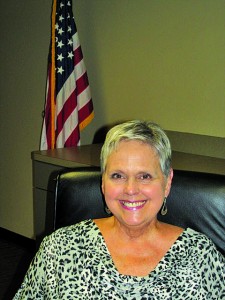Mary Beth Ridderman
By Julie Kerns Garmendia
Resident Community News
Mary Beth Ridderman spends many hours each week as a volunteer at Hubbard House domestic violence shelter, works fulltime and will complete her second Master’s degree (in mental health counseling) at the University of North Florida in Spring 2014. Her first Master’s, also from UNF, was in sociology. Ridderman needed an internship to complete her degree, had read and studied domestic violence and decided to work as an intern/volunteer at Hubbard House. The shelter was named for the Springfield street where it originally opened in 1976 and is the only shelter serving Duval and Baker Counties.

“Mental health counseling was always something I wanted to do,” Ridderman said. “I provide individual counseling, facilitate a support group for 8-20 residents and assist elsewhere as needed. It is important for residents to be able to work through their emotions and examine what is happening in their lives.”
Ridderman’s studies of domestic violence and her volunteer work at Hubbard House have shown her first-hand the tremendous need within the community for parents and children in danger to have emergency access to safe shelter and a variety of informational and educational support.
“Hubbard House fills such an important need in the community for victims of domestic violence and abuse. They need all the community support possible to continue to help so many. It’s just like a great big home and they need the same things we all need in our homes. The difference is they need such large quantities of necessities every single day. A typical grocery shopping trip for Hubbard House would be about three shopping carts full of food…they also need volunteers, group and corporate sponsors for financial support, in-kind contributions, hosts for holiday activities and special events, help with fundraising, preparation and delivery of meals. Someone could take over the Baby Closet to keep donated items organized for infants or the Professional Clothing Closet so that residents have appropriate clothing to wear for job interviews or work. The Teen Room could use new games and furnishings. My wish for them would be a much larger, or additional, facility to shelter more victims, with more staff and services,” she said.
Victims and their children sometimes arrive in the middle of the night with nothing. The Hubbard House uses donated items of all kinds to help residents put their lives back together and begin to work toward healing and normalcy. Ridderman said that it has been her privilege to work as a volunteer with these victims, but that it is extremely painful to see their hurt and emotional pain, especially the children.
“It hurts to see what they go through, but I have also seen the kindness and caring of so many who are moved to help. The simplest example was when I was in line buying groceries for the shelter. I recognized a former resident in line behind me. We spoke and although she was only buying one onion, she offered to help pay for the food because she knew it was going to feed families at Hubbard House,” she said. “People deeply care about this place and those who need it so much. Many former residents return to help or volunteer.”
Hubbard House provides safe shelter for up to eighty women and children and offers a variety of services for abused men, including assistance finding safe housing. They work to empower victims through counseling, classes and support and work for social change in the community through education and advocacy. They cooperate with many other local non-profit organizations and maintain a 24-hour emergency hotline, (904) 354-3114.
Domestic abuse is often a silent, hidden crime because the victim may be too terrified to seek help or leave the abuser. There are four main types of abuse: physical, emotional, sexual and economic abuse. Abusers and their victims are from every age, educational and economic background.
U.S. domestic violence laws focus on violent acts, but there is often a pattern of controlling and abusive behavior. Abusers may be sociable, friendly and outgoing outside of the home. They often appear to be genial neighbors and co-workers. No one may ever suspect and may not believe that they are abusive.
Ridderman, whom shelter manager Kay Davis said is an “integral part of the case management team whose knowledge and compassion have helped so many clients,” encourages adults of all ages to visit the Hubbard House website for donation and volunteer information. She said that she will continue to volunteer because it is so rewarding and that there are many opportunities for individuals or groups, those with little or a lot of time to volunteer. Volunteer training is provided, but there are jobs that require no special training.






